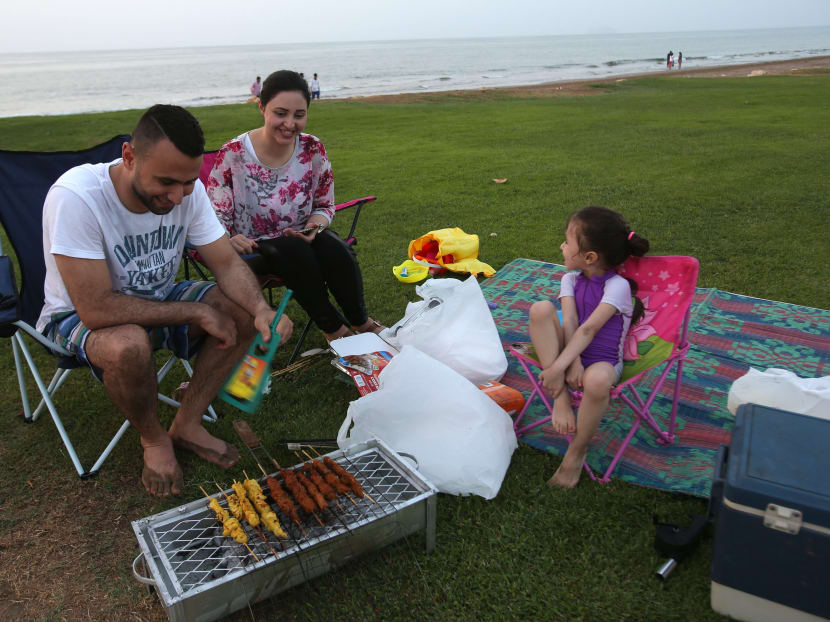‘Easy on the nuts’ as dollar crunch and inflation hit Ramadan spending in Egypt
CAIRO — Twelve people are seated around the dining table at Mr Mokhtar Gamal’s house, their mouths dry and bellies empty after a day of fasting during the holy month of Ramadan. Plates of food fill the table, and all eyes are on the stuffed grape leaves that are his wife’s speciality.

An Egyptian family gathers to break its fast at the beach in the Omani capital Muscat on June 17, 2016 during the Muslim holy month of Ramadan. Photo: AFP
CAIRO — Twelve people are seated around the dining table at Mr Mokhtar Gamal’s house, their mouths dry and bellies empty after a day of fasting during the holy month of Ramadan. Plates of food fill the table, and all eyes are on the stuffed grape leaves that are his wife’s speciality.
Family and guests dig into plates heaped with rice, grape leaves and chicken breasts, washing it down with pitchers of juice. A smile is fixed on Mr Gamal’s face, but his mind is on one thing: How much this feast costs.
A quick mental calculation puts it at 10 per cent of his monthly salesman’s pay of 3,000 Egyptian pounds (S$455.65). “I told my wife to take it easy on the nuts” when she’s making desserts, he said over coffee recently. “Nut prices have shot up.”
That middle-class Egyptians like Mr Gamal must scrimp on nuts gives a sense of the economic hardships his country faces. Core inflation is at a seven-year peak and a foreign currency crunch is impeding investment and growth, driving Egypt’s central bank last week to raise its benchmark interest rate to its highest in at least a decade.
President Abdel-Fattah El-Sisi has ordered authorities to stabilise prices and his government is distributing discounted food, in a bid to stave off the kind of dissatisfaction with his leadership that erupted into demonstrations just weeks ago. He’s failed to quell militants based in the Sinai peninsula who’s attacks have discouraged tourism. Critics accuse him of curtailing liberties and dissent, a charge he denies.
Annual core inflation soared to 12.23 per cent in May, two months after the central bank ordered the biggest one-time currency devaluation in more than a decade. With the Egyptian pound officially trading at a 25 per cent premium to black market dollars, policy makers on Thursday (June 16) tried to rein in prices by raising borrowing costs by 100 basis points, possibly setting the stage for another devaluation.
The inflationary spiral has made things especially tough during Ramadan, when food prices generally jump. Within the past three weeks the cost of food has climbed, with a kilogramme of rice, an Egyptian staple, nearly doubling in some markets to 9 Egyptian pounds from 5 Egyptian pounds. Even before the holiday, they had spiked nearly 50 per cent since the start of the year, according to the central bank.
“Merchants took us by surprise. How can prices jump” like this? asked Madam Mahasen Ali, a 45-year-old housewife. “What are people to do?”
Higher duties on so-called “luxury” items such as nuts put them further out of reach for most. Egyptians have also been bruised by a 20 per cent increase in the cost of locally produced medicines, which the government authorised to compensate drugmakers facing higher production costs as a result of the weaker pound.
PITCH IN
As Egyptians struggle with the price increases, officials are asking them to help stem the outflow of hard currency.
Television ads urge them to curb energy use and buy local products to help cut the import bill and shore up foreign reserves. At US$17.5 billion (S$23.6 billion), reserves have only started to inch up in the past couple of months, though still less than half of their levels on the eve of the uprising that toppled President Hosni Mubarak in 2011. Tens of billions of dollars in cash infusions by Saudi Arabia, United Arab Emirates and Kuwait have tapered off because of lower oil prices.
The government is also looking to save by paring subsidies that consume roughly a quarter of the state budget. It’s also looking to boost tax revenue by improving collection, and introduce a value-added tax seen as a key step to unlocking a long-awaited $3 billion World Bank loan.
Combined with expectations of another devaluation, inflation “could rise toward 15 per cent year-on-year during the second half of 2016” as the government moves ahead with reforms, Mr Bryan Plamondon, IHS Global Insight’s Middle East economic analysis director, said in an e-mailed report.
Barely a month after protests against El-Sisi’s decision to cede two Red Sea islands to Saudi Arabia, the government is aware of the need to avoid reigniting public discontent.
It has set up markets selling discounted food — chicken and beef, for instance, are going at up to half the price — and the military has been distributing goods on the street.
Thousands lined up at a food fair at the Cairo convention centre, waiting to buy everything from Ramadan staples such as apricots and nuts to meat, rice, sugar and cleaning products. A similar fair was held in every one of Egypt’s 27 provinces.
“If it wasn’t for this fair, we wouldn’t have been able to buy these things,” Mr Adel Abdel-Baset, a 48-year-old construction worker said, standing in one line while his wife waited in another. “Prices have increased in an unprecedented way.” BLOOMBERG






